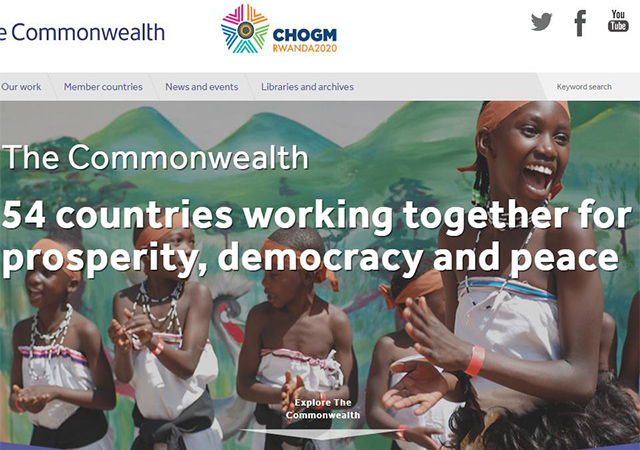 Commonwealth Secretariat website
Commonwealth Secretariat website
[This opinion piece, published on 19 March, appears in the latest edition of The Round Table: The Commonwealth Journal of International Affairs. Opinion pieces do not reflect the position of the Round Table’s Editorial Board.]
The rapid spread of the Coronavirus, also known as COVID-19, has forced many governments to draw up emergency national plans to fight the pandemic and to issue revised travel advisories asking their nationals to undertake minimum overseas travel. Last month, the Swiss government cancelled the Geneva International Motor Show scheduled for March 2020 and advised local organisations to avoid holding functions attended by more than a thousand participants. The Olympic Committee is also seriously considering cancelling the Tokyo Olympics in July this year. On 17 March Europe’s biggest football event, Euro 2020, was postponed to 2021.
The same consideration would apply to holding the Commonwealth Heads of Government Meeting (CHOGM) in June this year. If an announcement to reschedule CHOGM is not taken soon, it will be assumed that the meeting is going ahead as scheduled. However, nearer the time a number of Heads of Government might not want to travel to Kigali where more than a thousand delegates from different climate zones and affected regions would rub shoulders against each other at the Opening Ceremony, share drinks at the Secretary-General’s traditional reception and sit close to each other at the Retreat sessions.
In the event that the Kigali CHOGM is postponed, it will not be for the first time for the Commonwealth. I remember as the Deputy Conference Secretary of the Brisbane CHOGM in 2001 that Prime Minister John Howard, the host, was forced to cancel the meeting only nine days before the event, because the Prime Ministers of Canada, India and the UK had declined to travel to Australia owing to intelligence reports that Al-Qaeda was planning to target western interests globally. Australia eventually hosted a considerably truncated CHOGM in Coolum in March 2002. The Australian government paid a large amount of compensation to the key CHOGM hotels, which were block booked for the meeting. Compensation was also paid to the various other service providers whom the Australian government had contracted for servicing CHOGM. There may also have been costs to member governments for cancelling flights of their delegations to Australia and hotel reservations beyond the hospitality cover.
A timely postponement of CHOGM would save Rwanda expenses in the form of last minute cancellation of hotel and airline reservations. It is a well-established principle of the Commonwealth that CHOGMs are kept simple and host governments are advised not to go overboard on transportation, protocol and hospitality. Already, security takes a big chunk of the host government’s budget for organising the meeting. But with a threat like the Coronavirus, the host government may be saddled with the financial burden of importing expensive medical supplies and protective gear necessary to scan and clear delegates on arrival at Kigali airport, create elaborate quarantine facilities for those suspected of showing symptoms of infection, and diverting its scarce national health resources away from its national hospitals to cater for CHOGM. Of course, at the time of writing, the meeting is two months away but for international conferences, two months seem like three days because the processes involved in planning, seeking financial and executive approvals and putting things in place take an awful lot of time, even if staff work 18 hours a day, as is normal for any CHOGM preparation team.
I would therefore argue that the Commonwealth Secretary-General should immediately start consulting Heads of Government to explore the various options available to them for rescheduling the timing of their next meeting. In my view the meeting should be postponed by Rwanda until the autumn of 2020, which will bring the CHOGM cycle to the old calendar of October/November. Hopefully by then international travel would have resumed or it would become absolutely clear that CHOGM will have to be postponed till the autumn of 2021. Alternatively, Heads of Government should confirm attendance to the Secretary-General by the first week of May and if the confirmations fall short of the threshold needed for holding CHOGM, then the meeting should be postponed to a later date. A third option would be to replace the traditional CHOGM with a virtual online meeting by pushing the boundaries of video conferencing to its limits. But this may not be possible given the Commonwealth’s spread and various time zones of member countries.
In London, Heads of Government should unanimously agree through their High Commissioners to extend the current term of the Secretary-General until such time as the rescheduled CHOGM is held in Kigali when the item of the Secretary-General’s second term will be on the Retreat agenda. Countries which have withheld CFTC contributions in full or in part must show flexibility and reverse their decision to stop funding the Secretariat budgets until the next CHOGM. With a postponement, the toxic language and lines drawn in the sand on leadership change will hopefully weaken with time and countries will begin to engage in a more useful dialogue on the future of the organisation and the impact of its programmes on Commonwealth peoples and institutions.
Syed Sharfuddin is a former Special Adviser, Political Affairs Division, Commonwealth Secretariat, London.



